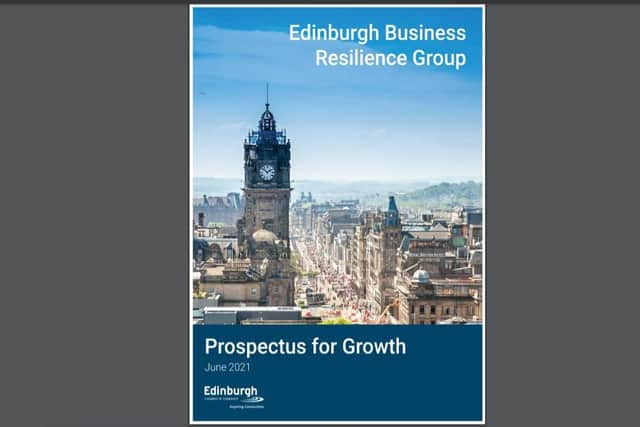Covid Edinburgh: Here's what businesses say needs to happen for city's recovery from pandemic
and live on Freeview channel 276
Let us know what you think and join the conversation at the bottom of this article.
The blueprint also proposed more business support for culture and the arts, a comprehensive aviation strategy and a gift card / loyalty scheme to help independent firms and hospitality businesses.
And it urged increased investment in skills, reform of business rates, promotion of inward investment and a streamlining of the planning process, all in the interests of helping businesses to grow and create jobs.


Advertisement
Hide AdAdvertisement
Hide AdThe manifesto has been produced by the Edinburgh Business Resilience Group, made up of more than 60 organisations in the commercial, social and private sectors, brought together by Edinburgh Chamber of Commerce.
Among those who helped put together the Prospectus for Growth were Charles Hammond, CEO of Forth Ports; Audrey Cumberford, principal of Edinburgh College; Les Bayne, former managing director of Accenture Scotland, now Alba Arete; Buster Howes, CEO of Edinburgh Military Tattoo: and Peter Mathieson, principal of Edinburgh University.
And other organisations signing the manifesto include RBS, Bank of Scotland, Lloyds Banking Group, Edinburgh Airport, LNER, Stagecoach, Edinburgh International Festival, the Tattoo, the Fringe, Harvey Nichols, PwC, Heriot-Watt University, Murray Estates and the St James Quarter.
The group is calling for a “reset” of the relationship between business and policymakers and proposes the appointment of a “business champion” within the council leadership.


Advertisement
Hide AdAdvertisement
Hide AdThe manifesto said: “In our work the one recurring theme which emerged is that there appears to be a disconnect at this point in time between businesses and policymakers at both city and national levels."
It said there was a feeling among businesses that policies on issues like sustainability, inclusion and fair work were being prioritised at the expense of more immediate re-opening decisions, and that policymakers were “too removed” from the difficulties faced by many businesses; while public officials felt they were doing everything they could to aid recovery and there needed to be more understanding that public resources were stretched and there had been dialogue with business throughout the pandemic.
The manifesto continued: “We need to bring a meeting of minds and viewpoints, increased trust, and meaningful collaboration which will significantly move the dial and create the kind of true partnership we need to recover and grow.”


Among immediate priorities the group has listed an accelerated return to workplaces “with clear guidelines and appropriate support to enable businesses to meet liabilities and to help employees feel safe and comfortable”, which would breathe life and energy back into the city centre.
Advertisement
Hide AdAdvertisement
Hide AdIt also wants revised physical distancing rules and greater alignment of Covid policies across the four nations of the UK.
And it called for support for companies facing “stifling” levels of debt after taking out loans to survive the lockdowns.
The manifesto also proposed setting up Edinburgh Means Business, a joint venture between the council, business, universities, cultural sector and third sector, which it described as “a campaign for recovery which morphs into a body potentially hosted by Edinburgh Chamber of Commerce” as a one-stop-shop for business support and promotion in the city.
And to help reset the relationship between the public, private and third sectors, it called for the appointment of a business champion – who would also co-chair Edinburgh Means Business – reporting to the city council’s chief executive, for an initial 12 months to support businesses reopening.
Advertisement
Hide AdAdvertisement
Hide AdIan Marchant, of Dunelm Energy, who chairs the Edinburgh Business Resilience Group, said: “Edinburgh’s efforts at recovery cannot become a Tale of Two Cities – our own divided narrative between long-term political aspirations and the present day needs of businesses and organisations who will be expected to create the jobs and opportunities of the future.
“As we continue to emerge from the pandemic through the success of the vaccination rollout the economy must now be the top priority for our policy leaders.”
The former chief executive at utility giant Scottish and Southern Energy added: "We need businesses to succeed and grow if we are to create jobs and opportunities for our citizens, if we are to encourage the move to net zero carbon, and if we are to tackle poverty through greater social inclusion.
“To achieve these aims we need businesses that are successful. To have successful businesses we need policies that encourage growth. We believe that by making the views of business known and by harnessing the expertise and energy our businesses have to offer, we can work with local and national government to deliver a better, stronger recovery. But we need them to listen and we need them to engage.”
Advertisement
Hide AdAdvertisement
Hide AdSpecific initiatives in the manifesto included Edinburgh Rewards Local, a gift card and loyalty scheme, sponsored jointly by the council and the private sector, for independent retailers and hospitality businesses which would reward both locals and visitors who spend in Edinburgh, attracting people back into the city centre and helping to protect jobs and employment opportunities.
It also called for a strategy to support entrepreneurial talent from under-represented groups to encourage diversity of business ownership.
The group said city businesses needed to do more to support live events, culture and tourism sector – and it offered examples such as subsidised tickets for staff, funding for outdoor city centre events and small city centre venues in empty shops or unused offices.
And it proposed a “joint, coherent branding” to allow key stakeholders to sell the city effectively.
Advertisement
Hide AdAdvertisement
Hide AdIt said inward investment would be critical to Edinburgh’s recovery. “The city needs to line up behind the Scottish Government Inward Investment Strategy – we need to double down on our existing strengths as a city to attract new investment.”
The manifesto noted that Edinburgh Airport, which had been a major engine for international trade, has seen passenger numbers drop to 1995 levels during. “As a city (and a nation) we need a comprehensive aviation strategy. International business is vital both to Scotland and to Edinburgh, which acts as a gateway to the rest of the country.”Liz McAreavey, chief executive of Edinburgh Chamber of Commerce, said: “We were delighted at the stellar quality of those who took part in all of the meetings and conversations that fed into the production of the Prospectus for Growth.
“We are now seeking engagement with the Scottish Government, the UK Government and the city council to see how we might work most productively together to deliver what is best for the city.”
‘One of the world’s greatest cities’
The manifesto makes clear Edinburgh has a lot going for it.
"We are a city with the most educated workforce in the UK, a flourishing tech sector, and at one point named Best City for Start Ups in the UK,” says the document.
“As a City, we have much to celebrate and be proud of.”
Among the highlights it notes:
Advertisement
Hide AdAdvertisement
Hide Ad• Edinburgh University is one of the world’s top 20 universities
• The Capital is home to eleven festivals
• It is the second most visited city in the UK
• Pre-pandemic, Edinburgh was the fastest growing airport in Europe
• The Edinburgh City Region contributes nearly 30 per cent of the Scottish national economy
What Covid has done
The pandemic has had a significant impact on the lives of Edinburgh citizens and businesses, says the manifesto.
Advertisement
Hide AdAdvertisement
Hide AdIn 2020 footfall in the city centre fell by around 78 per cent from its 2019 level.
Festivals and cultural and live events were much reduced or did not take place as we know them.
The city’s hospitality and tourism sector effectively closed down.
Edinburgh Airport passenger numbers are down to 1995 levels.
Levels of business failure are expected to increase.
A message from the Editor:
Thank you for reading this article. We're more reliant on your support than ever as the shift in consumer habits brought about by coronavirus impacts our advertisers.
If you haven't already, please consider supporting our trusted, fact-checked journalism by taking out a digital subscription.
Comment Guidelines
National World encourages reader discussion on our stories. User feedback, insights and back-and-forth exchanges add a rich layer of context to reporting. Please review our Community Guidelines before commenting.
